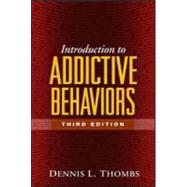This widely adopted text offers a balanced review of major contemporary perspectives on substance abuse and addiction, including disease models; psychoanalytic, conditioning, cognitive, and family systems formulations; and social and cultural foundations. Written in a lucid, accessible style, the volume emphasizes applications to the helping process and facilitates learning with case examples, review questions, and end-of-chapter summaries.









